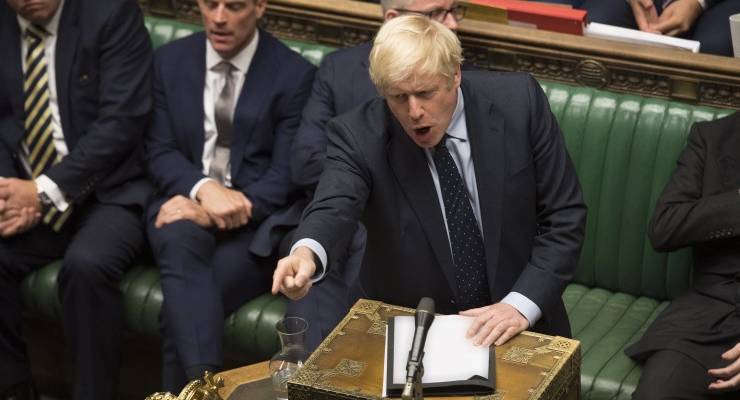
Remember when we thought Theresa May was a uniquely calamitous British prime minister? Turns out she was just the opening act for Boris Johnson — who, by losing his very first vote as prime minister, managed in a week something it took May around 15 months to achieve.
But of course, the whole Brexit process is like a John Landis film — you think you’ve seen the chaos already, and then the 103-car pile up starts. Early this morning, a group of Tory rebels — turns out there is such a thing — and opposition MPs defeated the government. This is the first stage of an attempt to pass a law designed to prevent a no-deal Brexit.
What happened with the votes?
The Commons voted 328 to 301 to take control of the agenda, meaning they can bring forward a bill seeking to delay the UK’s exit date.
So, is no-deal Brexit off the table?
Not yet, but blocking a no deal just became a lot more likely. Tomorrow’s bill to prevent a no-deal Brexit will be debated.
Who are the key players?
The UK government lost its working majority before the vote, as former justice minister Phillip Lee defected to the Liberal Democrats (remember them?); theatrically crossing the chamber as Johnson was updating the Commons on the G7 summit. Former British chancellor Philip Hammond had warned Johnson there were enough Tory rebels to block a no-deal Brexit, and more and more Conservatives said they would do just that. Ultimately, 21 Tories crossed the floor with some big names among them: former chancellor Ken Clarke, former cabinet minister Sir Oliver Letwin, former leadership contender and certainly never a spy Rory Stewart, Winston Churchill’s grandson Nicholas Soames, who is 71 and therefore can probably be given the benefit of the doubt for replying to Stewart’s declaration on Twitter with the hashtag “MeToo”.
To put it in context, as Financial Times political editor George Parker noted, in one day Johnson’s majority went from “+1 to -43“. Each of the defectors had the whip withdrawn.
What the hell does ‘withdrawing the whip’ mean?
“Withdrawing the whip” means that an MP or lord is effectively expelled from their party, and must sit as an independent until their party decides to restore the whip (which seems unlikely in this case). The party whip sends out a weekly circular (known as “The Whip” to avoid confusion, we suppose) to MPs and lords detailing upcoming parliamentary business and instructing them which way to vote.
If a vote is particularly important it is underlined three times (a “three line whip”). Defying a three-line whip is considered particularly serious. The term comes from foxhunting — the huntsman’s assistant who keeps the pack together is known as a “whipper-in” — because… sure.
Of course, Johnson’s sudden hardline stance on those defying the whip is interesting, given he is one of a number of Tories who voted against Theresa May’s withdrawal agreement more than once and without consequence. Another rebel-turned-teacher’s pet is elongated child Jacob Rees-Mogg, who spent the debate sprawled across the house bench like Little Lord Fauntleroy glugging his cocoa after a particularly taxing bread and butter pudding.
What now?
In response, Boris Johnson has said he would bring forward a motion for an early general election.
“I don’t want an election but if MPs vote tomorrow to stop negotiations and to compel another pointless delay to Brexit potentially for years then that will be the only way to resolve this,” he said.
Meanwhile, according to the Times, “Number 10 has been polling ‘culture war’ issues, such as transgender rights, to see whether they can be weaponised against Labour in northern working-class constituencies”.
If a snap election does happen, the 21 MPs who have had the whip withdrawn cannot stand for the Conservative party, and a number (including Stewart and Soames) have announced they will not stand for re-election.








Boris Johnson is a living replica of the Broadway show ‘Chicago’s’ Mr Cellophane – you can look right through him, walk right by him, and never know he’s there.
Hardly invisible – he’s been unignorably ubiquitous as Mr Blobby for several years now and, for his final trick, is appearing as the Marshmallow Monster at the end of Ghost Busters, wreaking havoc as was always inevitable when the streams are crossed.
There are many fanciful descriptions of JRM but I think “elongated child” is one of the best.
“Culture wars”? Did someone say Lynton Crosby? The UK now inheriting political traditions from the colonies.
Culture wars is just the current term for the usual conservative stock in trade. How else to get so many people to vote against their economic interests. However conservatism’s cohesion is much weakened by climate denialism.
Progressive politics has been intellectually and practically decimated by the ascendency of the destructive obsession with race, gender and toilets. This has pushed the economic agenda off into a sort of tacky unrespectability.
Plenty of grist for the various mills.
No mention that Johnson cannot call an election without a two thirds majority in parliament. With Labour voting against an election, it’s over for the tories.